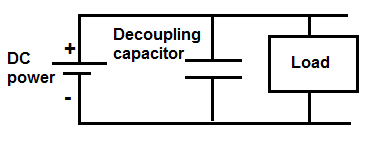What is Decoupling Capacitor??
What is Decoupling Capacitor?? In the strictest sense, no specific component is defined as a decoupling capacitor. In contrast, the term decoupling capacitor refers to the function of a capacitor in an electronic circuit. Decoupling capacitors are capacitors used to stabilize the voltage on the power plane.

In any design involving semiconductor ICs, decoupling capacitors are a must. This is because the voltage supplied to the components is far from ideal. Unlike the theoretically described perfect horizontal line, even with the cleanest power supply, voltage readings in actual applications will fluctuate.

Decoupling acts as an energy storage device and stabilizes the voltage in two ways. When the voltage increases above the rated value, the decoupling capacitor will absorb too much charge. At the same time, when the voltage drops, the decoupling capacitor releases the charge to ensure the stability of the power supply.
Generally, at least two coupling capacitors of different values are required to stabilize the voltage supplied to the VDD pin of the component. A capacitor in the 10 uF range can act as a larger buffer to smooth low frequency fluctuations. High frequency voltage changes are handled by smaller capacitors (usually around 100 nF).

